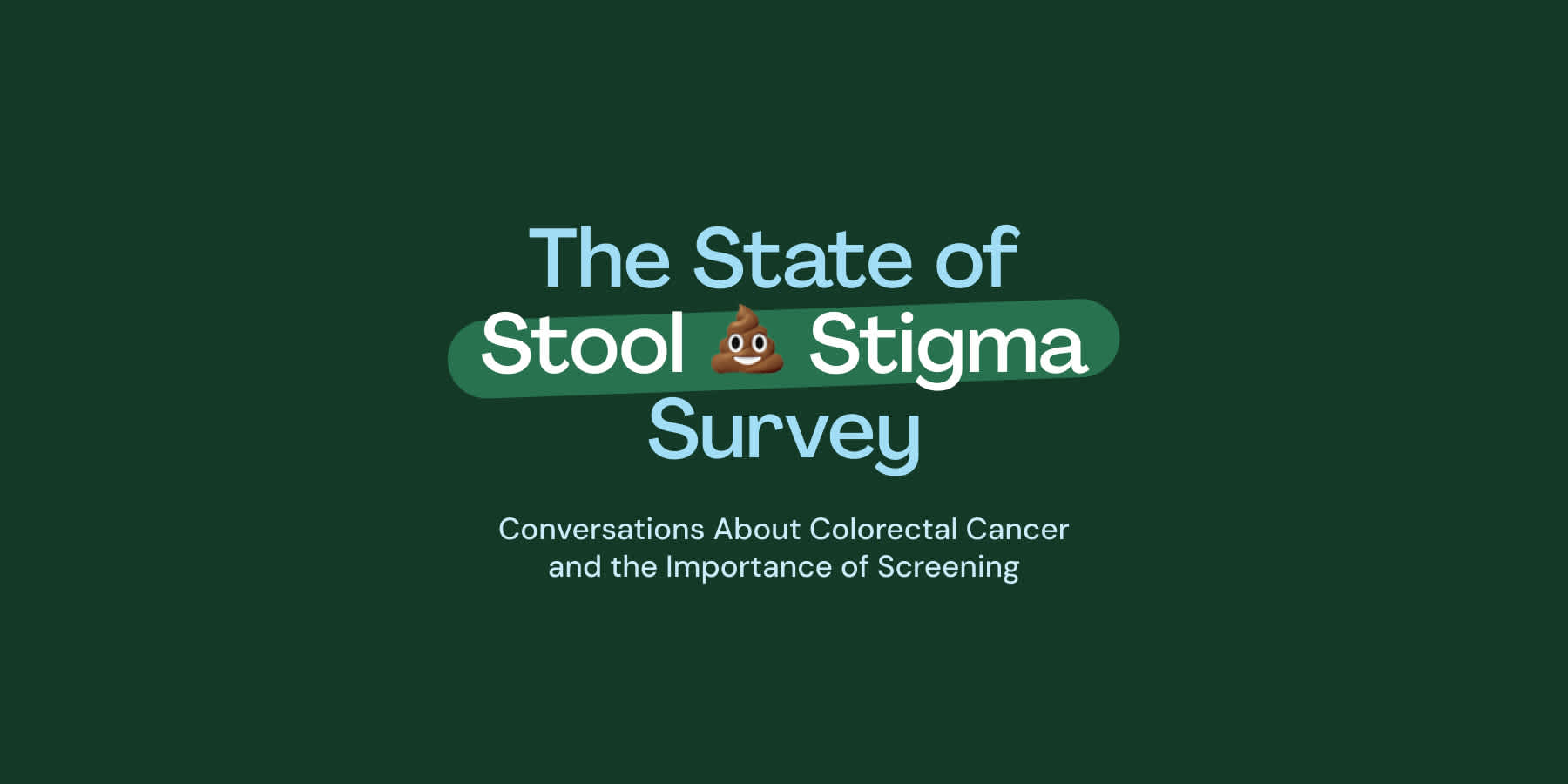Blog
The State of Stool Stigma Survey: Conversations About Colorectal Cancer and the Importance of Screening

Medically reviewed by Morgan Spicer, Medical Communications Manager on March 1, 2024. To give you technically accurate, evidence-based information, content published on the Everlywell blog is reviewed by credentialed professionals with expertise in medical and bioscience fields.
Table of contents
- My stomach always hurts, it's nothing serious.
- Does chatting about “bowel health” with your nearest and dearest sound less than thrilling? You’re not alone.
- Get screened. It’s easier (and less uncomfortable) than you may think.
- Related Content
Let’s face it, talking about your poop is uncomfortable, but it shouldn’t be a taboo topic. As colorectal cancer rates continue to rise, it’s crucial to increase awareness about prevalence and how to get screened. Because early detection saves lives.
To find out how far we have to go to break the stigma on colorectal cancer, Everlywell launched The State of Stool Stigma, a survey that polled 1,000 Americans, ages 18-55+, to learn about colorectal cancer awareness, barriers to screening, and stigma around poop talk, and here’s what we found.
My stomach always hurts, it's nothing serious.
While people generally understand what the colon is and its major functions–according to our survey data–there are common misconceptions about colorectal cancer that lead to barriers in people seeking important information about their colon health.
It’s easy for people to mistake colorectal cancer symptoms for other gastrointestinal (GI) conditions and vice versa, making education crucial.

Survey respondents were largely unaware of the biggest risks for colorectal cancer: lifestyle factors like alcohol use, lack of physical activity, and poor diet. [1]

Colorectal cancer is now the #1 cause of cancer-related death in men and the #2 in women under 50, but based on our data, people don’t know it. A majority of people surveyed ranked colorectal cancer as the #2 cause in men, behind prostate cancer, and #3 cause in women, behind breast cancer and ovarian cancer, for people under 50.
Does chatting about “bowel health” with your nearest and dearest sound less than thrilling? You’re not alone.
When it comes to colorectal cancer, flipping the script means normalizing poop talk. Survey data shows there’s still a lot of work to be done to de-stigmatize conversations about colorectal cancer.

Our data shows that even when speaking to close friends or family members, poop is an especially uncomfortable topic. Over 50% of people surveyed said they’d be more comfortable discussing it with a healthcare provider, rather than a friend or spouse/partner.

Your colon health shouldn’t be a taboo topic. Talking about colorectal cancer symptoms and screening is the first step in increasing awareness, which saves lives.
Get screened. It’s easier (and less uncomfortable) than you may think.
According to the American Cancer Society, a little over half of adults aged 45 years and older are up to date with colorectal cancer screenings, versus a goal of 80%. [2] When caught early, colorectal cancer survival rates are 90%, yet only 4 in 10 cases are caught early. [3]
"The impact of colon cancer can be devastating. But here's the good news: early detection is our secret weapon,” said Gabe Gaviola, MD, MPH, Chief Medical Officer at Everly Health. “Taking a simple screening like an at-home screening test, which you can do in the convenience of your own home, could save your life. Don't let fear or embarrassment stop you from doing this simple test. Remember, early detection is key, and your health is worth the extra step."

Even though a majority of people surveyed know that you can screen at home for colorectal cancer, testing rates remain low. Nearly 70% of people surveyed over 45 years old have never been offered an opportunity to take an at-home screening test from their health plan or employer.
At-home screening is an easy, reliable testing option, but according to our survey data, people have a lack of knowledge around why testing is important, feel embarrassed, and might not know where to access an at-home test.

Fortunately, Everlywell offers an affordable at-home FIT Colon Cancer Screening Test that is covered by HSA/FSA benefits. This simple, non-invasive test screens for the presence of hidden blood in the stool to help detect early signs of colorectal cancer.
For Colorectal Cancer Awareness Month and beyond, help us de-stigmatize poop talk. Talk to your loved ones and healthcare providers about colorectal cancer, risk factors, and screening. Early detection saves lives, and education is the first step.
Related Content
Colon Cancer in Younger Adults Is on the Rise: Here’s What to Know
We Asked a Registered Nurse What You Should Know About Colon Cancer Screenings—Here’s What She Said
How to Talk About Cancer Screening With a Loved One
References
- Done JZ, Fang SH. Young-onset colorectal cancer: A review. World J Gastrointest Oncol. 2021 Aug 15;13(8):856-866. doi: 10.4251/wjgo.v13.i8.856. PMID: 34457191; PMCID: PMC8371519.
- American Cancer Society. American Cancer Society National Colorectal Cancer Roundtable recognizes efforts to increase colorectal cancer screenings. Accessed February 26, 2024. Available: Medical Citation URL
- American Cancer Society. Can Colorectal Polyps and Cancer Be Found Early? Accessed February 22, 2024. Available: Medical Citation URL
Spotlight on
Featured content

86% of cancers aren't caught by recommended screenings. See what they're missing with a single blood draw.
Save $100 now
Explore Everlywell








